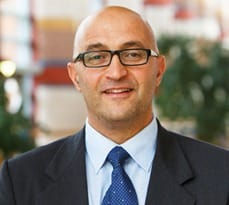A special issue of Thunderbird International Business Review is guest-edited by Dr Khaled Soufani and two others associated with the Circular Economy Centre at Cambridge Judge Business School.

The Director, a current and a past Fellow of the Circular Economy Centre (CEC) at Cambridge Judge Business School were guest editors of a special new issue of Thunderbird International Business Review on “Companies in the Circular Economy” (DOI: 10.1002/tie.21939).
The journal, published by Thunderbird School of Global Management at Arizona State University, also includes three articles by the guest editors: Khaled Soufani, Director of the CEC and Faculty (Professor level) in Management Practice at Cambridge Judge; Mark Esposito, Fellow at the CEC; and Terence Tse, former Fellow at the CEC.
“We launched the Circular Economy Centre only a few years ago, and we have already seen a big increase of interest in this area from both academics and practitioners,” says Khal Soufani. “This special issue of Thunderbird International Business Review is further evidence that people are looking seriously at many aspects of how reuse and remanufacturing can have a big impact on society and the economy. It’s also a reminder of how far we still have to go in this area.”
The lead article in the special issue (“The circular economy: an opportunity for renewal, growth, and stability”), co-authored by the three guest editors, identifies three key areas of opportunity that can point the way toward creation of a more circular economy.
The first opportunity reflects the world’s increasing urbanisation. “’Megacities’ are here to stay,” the article says – and “the concentration of human activity in cities means that it is that much more realistic for us to recover and treat postconsumer materials on a large scale to prepare them for reuse in a new capacity.” For example, the Paris-based company Veolia operates in 40 countries, and its activities include treating wastewater to become potable water or for use in power generation and fertiliser.
The second opportunity comes from the shared economy, through such services as bike sharing, car sharing and home-sharing at companies such as Airbnb – again illustrating the economy of scale in the circular economy.
A third immediate opportunity comes from the building environment – such as virtual offices, new technologies such as 3D printing and solar roofing, and more repurposing of material from demolished buildings. Currently, more than half of demolition materials are sent to landfills.
A second article in the special issue of Thunderbird International Business Review, co-authored by Mark Esposito, looks at circular economy business models in developing countries – with a focus on lessons from India.
For example, clean-tech company Attero focused on five areas of sustainability: offering customised solutions for electronic asset management in areas such as sanitisation and destruction of material; a countrywide collection network for e-waste; eco-friendly resource recovery from e-waste that extracts rare earth and precious metals; clean-tech electronics recycling; and an e-commerce platform for selling refurbished and surplus electronics.
A third article in the journal – co-authored by Mark Esposito, Terence Tse and Khaled Soufani – looks at how postal service networks can be instrumental in the “reverse logistics” in a circular economy.
“The question of how to manage the recovery of waste – which might include such disparate items as working mobile phones, package waste, and inkjet cartridges – from billions of homes and consumers and get them back into the global materials pool so that the residual value of waste is captured and returned to being a resource is to be addressed if the circular economy is to move from theory to practice,” the article says.
National mail services have huge delivery networks that are underutilised in the modern economy, so these networks could be pivotal to circular economy initiatives – as “they have a closer relationship with consumers than companies and corporations because they stop by consumers’ homes every day,” the article says.
The Editor of the Thunderbird International Business Review, Mary B. Teagarden, notes that scholars have focused on the relationship between economic growth and degradation of the physical environment since the 1962 publication of Rachel Carson’s landmark book Silent Spring, and the term “circular economy” was coined in a 1966 essay by Kenneth Boulding entitled “The economics of the coming Spaceship Earth”.
Other articles in the special issue of the journal examine such topics as maximising the value of waste, “cradle-to-cradle” green marketing, and sustainability-driven innovation.


